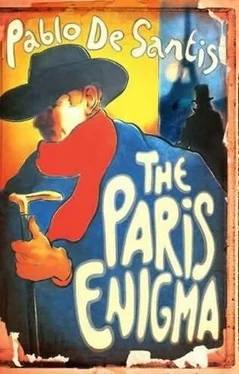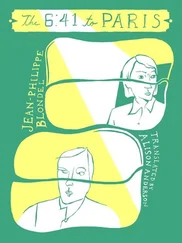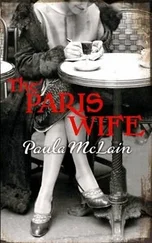Grimas stretched out his arm and handed me some back issues of Tra ce s . It was obvious that it was a relief for him to be able to get rid of some of those papers.
“So you can familiarize yourself with Tanner’s style.” “Thank you very much. I’d love to have them, although I’m already very familiar with Arzaky’s cases.”
“You already know them? Oh, of course, The Key to Crime .” Grimas said the name of the Argentine magazine disdainfully. He looked at the clock on the wall and leaped from his chair. “You’ll have to excuse me, but I have to go to the printer’s. I’m sorry I haven’t been much help with the two occultists. After involuntarily becoming one of the protagonists in the Case of the Magnetizer, Grialet went to live in Italy.”
“He was involved in a criminal investigation?”
“Yes, the detective was Arzaky. Didn’t he tell you anything about it? Ask him, or look for the case in issue forty-five of Tra ce s , which I just gave you. The one with the green cover. As I said, Grialet went to Rome to live for a while. He became involved with the widow of a general, who gave him large donations for the Hermetic cause. I think the ruse he used was the publication of the complete works of Fabre d’Olivet. Once he had the money he returned to Paris, but he hasn’t been seen much since he got back. And, of course, he hasn’t published even a brief treatise. I don’t know where he lives now, but he’s not hard to recognize: his right ear is missing, lost in a fight at the now defunct Pythagorean Society of Paris. And as for Bradelli, he died three months ago.”
“A natural death?”
“Natural for a man with his somber disposition. He poisoned himself. During the last few years he had tried to apply his knowledge of alchemy to painting. His frequent use of mercury provoked fits of madness and finally poisoned him to death. Three years ago he had promised the Autumn Salon a painting in which he had created new colors never seen before. To heighten anticipation, he published an article in one of Grialet’s magazines, Anima Mundi , where he refuted Goethe’s theory of colors as well as Diderot’s. He announced the names of the new hues, which were a mix of Latin, Catholic liturgy, alchemy, and even necromancy. They were designed to alter the viewer’s perception and provoke sensations in him that transcended the subject matter. Painting, he said, must be a secret message; in the color one finds true meaning. When, after much beating around the bush, and many announcements and retractions, he finally presented his paintings, he pointed out the new colors: diabolical topaz, larva yellow, mandrake green, and silentium blue, and a dozen more. We saw only grays and blacks, and large areas where the white of the canvas hadn’t even been touched. That was Bradelli’s last work.”
I followed Grimas down the stairs and we said good-bye at the door.
With Bradelli dead, I needed to find Grialet. The Dorignac bookstore, like everything in Paris, was hidden. If I hadn’t written the address down, I would have walked right past it. There was a main room where history books, innocuous new arrivals, big volumes with pictures of military uniforms, and anatomy guides were gathered on large tables. But all those books were the facade behind which Mr. Dorignac carried out his true mission: the chosen few had to go down some stairs and to the back of the shop to find, behind a worn velvet curtain, the real bookstore.
Two other people were there when I entered, a tall, elegantly dressed lady who wore rings with snakes on them, and a gentleman who had rather greenish skin. Apart from his color, he seemed to be in perfect health. The gray-bearded bookseller completely focused on assessing a shipment of used books that had arrived in a trunk. The lady feigned interest in a dictionary, which she set aside quickly, and made a gesture to the bookseller with her head. He responded with a nod of approval, and the lady vanished behind the red curtain. Minutes later, after leafing through a thick book by Michelet entitled Bibles of the World , the green gentleman made the same sign of complicity and received an identical response. I waited for the gentleman to disappear behind the curtain and then I perfectly imitated the seriousness of the gesture. I was about to go past the threadbare curtain that separated me from the Mystery, when the bookseller stopped me.
“Who are you? Where are you going?”
I shook the hand that he put in my way, and I introduced myself. “Monsieur Dorignac? My name won’t mean anything to you. I am Monsieur Arzaky’s assistant.”
“Arzaky is an enemy of everything here.”
I drew close to his ear.
“Monsieur Arzaky is having a crisis of faith. He has poured himself into reading the occult texts, but he has no discipline. He wants it all at once: alchemy, spiritualism, black magic. He mixes stills with crystal balls, sulfur with Haitian dolls. I’m afraid he’s headed for disaster. And that he’ll end up like…” Just then the green gentleman left the bookstore empty-handed. He had spent no more than a minute in the forbidden section.
“Poor Serdac, so persistent in his experiments. He comes here to look at the cover of the most expensive book I have. It’s enough for him to know that it’s here and then he leaves. He doesn’t look good, but he’s in better health than he was when his skin was white. Similar methods have greatly reduced the clientele of our bookstore. The ones that don’t end up in a hospice, blow themselves up. The ones who don’t die in an explosion, end up with sulfur poisoning. Suicides are the order of the day. I’ll confess that lately I’ve been hiding the most dangerous books, so I won’t go bankrupt for lack of readers. As for Arzaky, I can’t help him. I’m sure your detective already has the books he needs.”
“One never has the books he needs: he has too many or too few. That’s why I was looking for Monsieur Grialet. I trust that he can help me get Arzaky back to his cases.”
“And why would I want Arzaky back on his cases?”
“Do you want them to accuse the Martinists of having driven Paris ’s great detective crazy? Or the Rosicrucians? Or you yourself, who nourishes all those impressionable minds with your books?” “He’s not the Detective of Paris, Darbon is.”
“He was, but Darbon was murdered while investigating some of your customers.”
“Don’t think you’re telling me anything I don’t know. I run a bookstore, but I read the newspapers too.”
The curtain opened slightly and a woman’s hand, filled with rings, waved the bookseller over. Did she want to know the price of a book? Was she looking for some title that wasn’t on the shelves? Dorignac’s haste in attending to her made me think that it was something more mundane than the search for knowledge. From what I had been able to observe, good booksellers invariably wait on customers in an offhand manner, convinced that everyone will eventually find the book they want without any help. If the bookseller takes care of a customer, it’s not about a book.
Dorignac, rushing to help the woman, found a pencil and jotted down the name of a street that I wasn’t familiar with.
“I recently sent him a package at this address. Grialet devotes his days and nights to searching through thousands of pages to find the perfect quote, the one that will save him. Then he gets rid of the books. He believes in these things.”
“And what do you believe in?” I asked as I put the piece of paper in my pocket.
“Surrounded by dangerous books as I am, I believe that our only hope is in forgetting the quote that we once read, the one that will lead to our downfall.”
Dorignac vanished behind the red curtain.
Читать дальше












